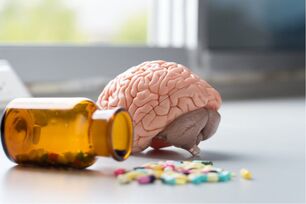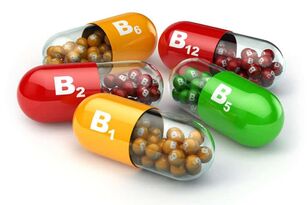Hello dear readers! Have you ever felt that your brain is tired from work and your memory is starting to decline? I assure you: most people on the planet experience such feelings. Of course, all the culprits are excessive work, the impact of megacities, chronic diseases, stress, simply aging, with which the body fights with the help of nutrients. As a result, our brains simply do not always have enough vitamins and minerals, because the saturation of foods with vitamins and minerals, as you know, leaves a lot to be desired. And drinking a complex of vitamins and minerals takes a couple of weeks, and everything gets better. Let's look together at which vitamins best improve brain function and memory.
What vitamins are needed by the brain?
The brain is the main organ in our body that is responsible for regulating all organs and systems. Due to stress, malnutrition, diseases, hormonal imbalances, the efficiency of its functioning decreases.

Vitamins play an important role in the work of the central nervous system. So-called organic compounds with different chemical nature. They are found in food and get into the body with them. Some of them are produced by our body itself. But due to reduced immunity, low quality products, these compounds are often lacking in our body. And the brain is the first to respond to deficiency. Memory is disrupted, concentration decreases. Every body system or organ needs certain biological substances, vitamins and minerals more than others. For example, hair needs biotin, zinc, selenium (I wrote about vitamins for hair), the immune system - vitamins B, C, vit. D3, a woman's body needs vit. Groups A, E, B, after childbirth a woman also needs vitamins.
Personally, I'm on natural vitamins, food, herbs, extracts, and I've written a lot about it, but sometimes the body needs to be supported with pharmaceuticals, and at certain moments in life they are simply needed.
And to avoid confusion about which products contain which vitamins, read the article "Choose vitamins in food by color".
Children in particular need regular vitamin intake. Their bodies are growing rapidly and they need nutrients to form new cells. To compensate for the lack of vitamin compounds, doctors recommend taking pharmaceuticals with synthetic analogues.
Of the many beneficial compounds in the body, pay attention to the following substances that are vital for the normal functioning of the brain.
Beta carotene and vitamin A
Beta-carotene is a compound that is converted to vitamin A by the coloring pigment. The substance improves memory, vision, protects the brain from adverse effects. The connection prevents degeneration of thinking.
B vitamins
The group includes several vitamin compounds that are useful for both adults and children. They are powerful antioxidants. If it is not enough in the body, the neurotransmitters are destroyed. Each type of vitamin affects the brain in its own way:
- B1 (thiamine).Most substances are found in the brain and central nervous system. This has the greatest effect on memory. The compound prevents the brain from aging by providing oxygen to the tissues. Vitamin B1 deficiency develops depression, weakness and fatigue.
- B2 (riboflavin).The compound provides the body with energy, stimulates the active work of the brain. If the vitamin is not enough, you will feel tired.
- B3 (nicotinic acid).The substance is required for the synthesis of enzymes. The compound helps the body produce energy, providing it to the brain.
- B5 (pantothenic acid).Vitamin A is very unstable and is quickly destroyed during cooking. The connection is responsible for long-term memory, the transfer of information between brain cells. The compound protects the brain from the effects of nicotine and alcohol.
- B6 (pyridoxine). The connection improves thinking skills, prevents depression. It is better to use vitamin preparations to provide this substance to the body.
- B9 (folic acid).Vitamin is responsible for memory, normal functioning of the nervous system, gives energy. The compound helps pregnant women to give birth to a healthy baby, as it is necessary for the formation of the fetal central nervous system.
- B12 (cyanocobalamin).The substance provides a transition from sleep to wakefulness and vice versa. Bonding is also closely related to short-term memory. In the absence of B12, a complex adaptation appears as the time zone changes.

Vitamin C
We know ascorbic acid as a substance for activating the immune system. But the substance relieves mental strain, it is recommended in case of fatigue. As an antioxidant, ascorbic acid also protects the brain from aging.
Vitamin D
In addition to improving the condition of the skeletal system, vitamin D or calciferol is needed to improve mood and memory. It protects the nervous system from diseases, including oncology, and stimulates the cardiovascular system. Calciferol deficiency causes cognitive impairment. Learn more about vitamin D and the foods it contains.
Vitamin K
Vicasol or vitamin K is used to speed up the brain, slow down the aging of brain cells and prevent Alzheimer's disease. The connection improves cognitive function.
Lecithin
This is the name of a phospholipid that stimulates the nervous system. In the presence of vitamin B5, it is converted to acetylcholine, a neurotransmitter that is responsible for transmitting nerve impulses.
In the first years of life, the baby's body receives lecithin from breast milk. Speech development, social adaptation and baby development depend on the amount of phospholipid received. Lecithin helps an adult maintain efficiency, feel less tired. Learn more about lecithin and foods that contain it.
Omega-3 fatty acids
These compounds found in fish oils, nuts and seeds are literally brain foods. They speed up reaction time, improve memory and help maintain mental clarity.
Creatine
Nitrogen-containing amino acid accelerates cell regeneration. It has an energy-saving role, it provides good memory and analytical thinking. 5 g is enough to keep the brain working.
L-tyrosine
Amino acid found in muscle tissue. It provides synthesis of epinephrine and norepinephrine, the neurotransmitter dopamine. Supplements with this substance are intended for people with mental work. It improves concentration, raises the fatigue threshold.
L-carnitine
Another amino acid that improves memory and brain function. If you take the supplement regularly, you can activate the brain, prevent chronic fatigue and increase efficiency.
Signs of Vitamin Deficiency
Several factors can damage brain cells. They gradually recover, but with age, malnutrition, disease and stress the process slows down. Lack of vitamins for cell formation and basic central nervous system functions affects brain function:
- develops depression, anxiety, aggression, mood swings;
- memory degradation;
- has impaired coordination;
- sleep is disturbed;
- apathy appears, fatigue appears;
- is a headache;
- distraction appears, difficulty concentrating;
- The thought process slows down;
- weight loss, appetite;
- Children have learning difficulties, increased fatigue.
Vitamin deficiency can mask more serious diseases. It is better to consult a doctor before taking the medicine, as an allergic reaction or other reactions are possible against the background of existing pathologies.







































































